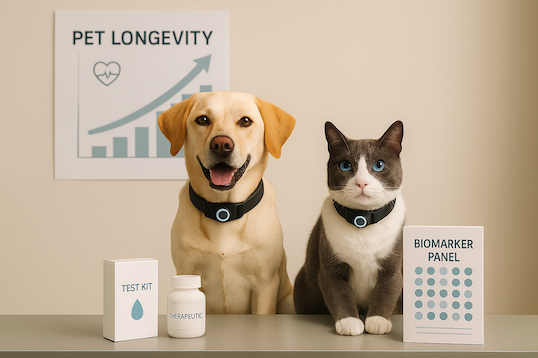Our Thesis on Molecular Diagnostics
We see a future of diagnostics where both data and technology have strong roles to play.

At 2048 Ventures, we are obsessed with the future and invest in the earliest-stage companies that establish defensibility through data and technology.
Lately we have been focused on the future of diagnostics, where both data and technology have strong roles to play. From the earliest stages of biomarker discovery to the methods by which they are measured, quantitative biology underpins preventative medicine, precision therapeutics, and chronic care.
Molecular diagnostics platforms are those that make use of proprietary data sets to identify disease-related biomarkers, and adaptable chemistries capable of detecting them.
At 2048 Ventures, we believe the future of molecular diagnostics is one with:
- Novel programable chemistries that improve sensitivities and allow easy integration of biomarkers and molecular tools (Sherlock Biosciences, VedaBio).
- Highly sensitive tests that allow early detection, with potential to replace current gold standards that rely on invasive techniques (Metadeq, Guardant Health).
- Ability to generate large, unique, and proprietary data-sets (”systems of records”) AND leverage data captured, learnings and infrastructure to further refine the platform and expand the range of tangential indications (Tempus, Biodesix, Guardant Health, Viome Life Sciences).
- A layer of infrastructure that allows molecular diagnostic companies to tackle all the above seamlessly, swiftly and at scale (Hurdle).
Diagnostic startups we want to meet
While some segments of the molecular diagnostics space are densely populated and dominated by a few major players, we believe there is potential for growth and innovation.
- Programmable and multiplex molecular tests applicable across different diseases and disease states by just tweaking the biomarker of interest.
- Gut health assessment providing actionable output (e.g. coupled with recommendations on dietary supplements or specific food).
- Highly sensitive liquid biopsy for early diagnosis, monitoring and treatment response in chronic conditions (e.g. autoimmune, metabolic).
- Infrastructure to help early- and mid-stage diagnostics tests transition from preclinical to clinical assets.
How diagnostics startups can build defensible business models
We have observed different business models in this space and are most interested in Diagnostics as a Service (DaaS) to providers or pharma as they have potential to capture more value. These typically look like fee-for-service or institution contracts with potential expansion into SaaS (e.g. providing software to re-analyze data). We further see value in Infrastructure as a Service (IaaS) to diagnostics companies.
Defensibility is another common question for diagnostics companies. Those clearest to us include:
1) Novel Chemistry Model
- Groundbreaking chemistry to detect relevant, previously undetectable analytes.
- Chemistry is versatile and able to adapt to a broad range of biomarkers.
- Competitive edge is built on the uniqueness of the patented chemistry.
- The technology's broad applicability allows for licensing or in-house use.
- Examples include Sherlock Biosciences, VedaBio or NuProbe.
2) “System of Records” Model
- Extensive datasets for diagnostics that incorporate novel analysis techniques.
- Multi-omics, paired sample types, and longitudinal datasets with EHR records.
- Possible applications in companion diagnostics and precision medicine.
- Datasets can be leveraged to explore tangential indications.
- Examples include: Tempus or Biodesix.
Our preference is for Novel Chemistry Model based on highly defensible tech. These are much more rare. As long as there is protective chemistry, datasets can be either self-sourced or built from publicly available datasets.
Diagnostic Pain Points
Problems in the diagnostics space include:
1) Satisfy higher testing volumes by maximizing available resources. Opportunities created:
- Automation of diagnostics to free-up time of technicians, increase speed and prevent human errors.
- Multiplex and multi-biomarker platforms that allow multiple tests in one single run.
- Multi-disease detection tests (e.g. multi-cancer early detection tests).
2) Need for early disease detection in chronic diseases. Opportunities created:
- Novel chemistry or combination of modalities (e.g. nucleic acids, exosomes, metabolites) that lead to increased sensitivity and accuracy, enabling early detection.
- Solutions able to capture high-level features in chronic disease before onset.
3) Need to improve the ability to distinguish between signal and background in large complex datasets, while generating actionable information. Opportunities created:
- Integration of multi-omics interactions.
- Platforms able to extract and interpret meaningful information.
- Platforms with built-in large and proprietary datasets, ideally useful across disease areas.
Looking into the future
The application of adaptable technologies and data create what we see as the ideal diagnostic company: one posed to become the Swiss army knife of the industry. This adaptability and ability to improve by continuous iteration not only secures their competitive edge, but also empowers them to address a multitude of challenges and needs.
Are you or someone you know working in this area? We want to speak to you! Send your materials to 2048.vc/pitch-us and let’s build the future of diagnostics together.
Subscribe to our newsletter
Signup to get blog posts with our investments, theses and important announcements from 2048 Ventures.


